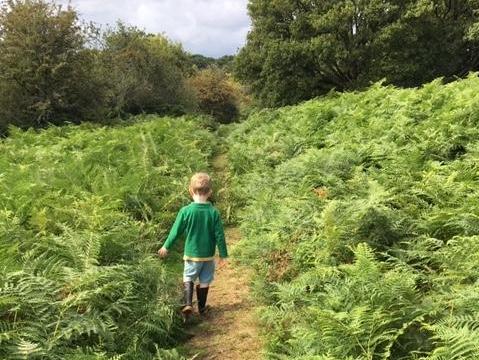The tragic death of a refugee braving the Channel is a brutal reminder not to take our island privileges for granted
In his latest reflection on ideas of place and pathway, Will Gore enjoys a day trip with his child, while someone else’s son tries desperately to cross the sea to Britain


We had lunch late, my son and I. Earlier we had been to the barber for the first time since February: during lockdown, I had been cutting the boy’s hair and mine; and it was becoming intolerable for all concerned.
After his trim, which he took with sweet seriousness, Tristan announced that he wanted to ride his bicycle on the nearby playing fields. So off we traipsed, me with spanner in hand to remove the bike’s stabilisers. By the time we got home, it was nearly one o’clock and I still needed to bake the bread I had left rising.
Still, it was worth the wait. The loaf, we decided, was one of the best ever. I had mine with smelly cheese; Tristan had his with butter and a carrot by the side. Each of us decorated our plates with a flower from the nasturtium plant which Tristan had chosen in mid-March and grown from seed.
It was only the two of us at home. My wife was at work and my daughter had gone straight from her socially distanced drama club to a friend’s house for a socially distanced play date. I’d taken annual leave and anticipated a day-long battle of wills with a five-year-old. So far, though, so good: undivided parental attention helps.
Did he play in the Sudanese countryside when he was five years old? Did his father look fondly upon him? Or was he, by the geographic randomness of his birth, used only to conflict and poverty?
We had already agreed that once we’d eaten, we would go to the woods. I knew that the later we left it, the greater was the chance of getting rained on – but once the kitchen had been tidied and we were ready to head out again, the sky remained mostly blue. I realised my boots were in my wife’s car, which seemed a bad omen.
But Tristan noticed with delight that our resident frog, Trevor, was happily back in the pond after many days of absence; a better portent.
Driving the few miles to the National Trust-managed Ashridge estate, we decided that today we would do a brackeny walk, rather than diving into one of the more mature areas of woodland. We had a plastic container and planned to look for blackberries, and to keep our eyes peeled for interesting birds which Tristan could tick off in his I Spy book.
The bracken, acre upon acre, was gloriously tall: Tristan could see little but green fronds to left and right, and sky above. Our blackberrying was a little half-hearted if the truth be told. But near one bramble we saw enormous dragon-flies dancing, and above another two buzzards mewed plaintively. In a copse of silver birch, a flock of long-tailed tits flitted from tree to tree. “They look like tiny jays,” said Tristan with authority. There was something in that, I thought.
The trees soon thinned again and a new sea of bracken appeared, tumbling down a hillside. Heat radiated from ferny fronds: a damp, heavy heat, almost sauna-like. I sat on a bench and watched as Tristan explored the green waves. I was reminded of my own childhood holidays, playing among the rocks and bracken of the Peak District.
Behind us, on a vast field of grass, a few dogs were being walked. They were all friendly, but at the noise of barking, Tristan came over, wanting a hand to hold. His fear of dogs – mild, thankfully – is yet another echo of my own past.
We walked back to the car, listening to the distant rumble of thunder and occasionally glancing nervously round at the gathering storm. But the rain didn’t come; at least, not more than a few spits and spots. We got lucky.
Not so the young man from a distant land who tried to cross the Channel later that day in a flimsy dinghy, and who was washed up dead on a French beach. That lad, who may have been 16 or perhaps 28, but who was someone’s boy nonetheless: he had a backstory, a family – but no longer a future.
Did he play in the Sudanese countryside when he was five years old? Did his father look fondly upon him? Or was he, by the geographic randomness of his birth, used only to conflict and poverty?
Evidently, he hoped for something better than he had, journeying to France with a dream – however distant – of the chance of a new life in Britain. And now he is dead, like thousands of other would-be refugees who have, in desperation, drowned in various seas in recent years. Some of them have been just kids – remember Alan Kurdi?
All of them have been somebody’s child. Each of them should be more than merely a discussion point for politicians and radio phone-ins.
We are lucky indeed, my son and I. We must never forget it.
Join our commenting forum
Join thought-provoking conversations, follow other Independent readers and see their replies
Comments
Bookmark popover
Removed from bookmarks